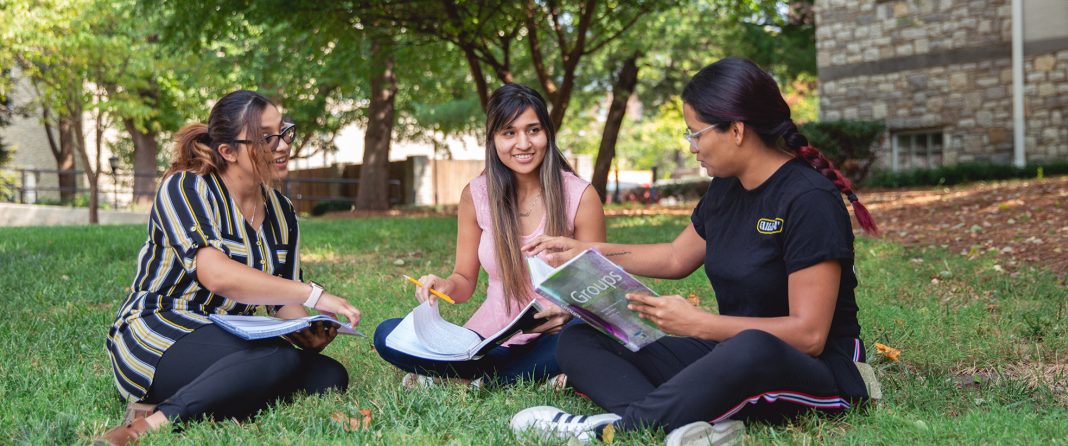Overview
“The primary mission of the social work profession is to enhance human well-being and help meet basic and complex needs of all people, with a particular focus on those who are vulnerable, oppressed and living in poverty,” explains the National Association of Social Workers (NASW). “Social workers help relieve and alleviate people's suffering, fight for social justice and improve lives and communities.”
Students who earn a Bachelor of Science in social work receive the foundation needed to care for people in every stage of development, from children to the elderly. Social workers help individuals overcome some of life’s most difficult challenges and troubles, including:
- Abuse
- Addiction
- Child welfare concerns
- Death
- Depression
- Disability
- Discrimination
- Divorce
- Mental illness
- Physical illness
- Poverty
- Stress
- Unemployment
The mission of Trevecca’s social work program is to provide an integrated, generalist social work education based on Christian values. Our program promotes rigorous scholarship and deep personal growth for students in preparation for lives of leadership and service. The social work program develops graduates cognitively, emotionally, physically, socially and spiritually. As the program seeks to integrate faith and learning in social work practice, students will strive to uphold the core social work values which include service, social justice, dignity and worth of the person, importance of human relationships and integrity and competence.
The social work program at Trevecca is accredited by the Council on Social Work Education (CSWE), which is supported by the Council on Accreditation (COA). Students who earn a Bachelor of Science in social work graduate as generalist social work practitioners, meaning that they have completed the course and field learning necessary to be able to practice as a professional.
Graduates of Trevecca’s social work program will:
- Be competent in the knowledge base of social work and its disciplines
- Be prepared for beginning-level social work practice or graduate studies in social work
- Demonstrate commitment to the basic values and ethics that shape social work practice from a Christian perspective
- Recognize and appreciate cultural and social diversity including patterns and consequences of discrimination and oppression
There are nearly 700,000 professional social workers in the United States today with their bachelor's, master’s and doctorate in social work. and that number is growing. According to the U.S. Bureau of Labor Statistics, social work is one of the fastest-growing professions in the United States. The NASW projects employment in the field will grow by 16 percent by 2026—faster than than the average for all other occupations.
Faculty
General Resources
News
Core Classes
Introduction to Social Work
SWK 1200
This course offers an introduction to the field of social work and its mission of social justice and equity at the micro (individual), mezzo (group), and macro (community and organization) levels of society. Students will explore the history, key theories, and diverse work of the profession with consistent focus on often oppressed and marginalized communities. Throughout this course, students will discover the core values, ethics, personal skills, and characteristics required of social work practitioners.
Course Hours: 3
General Sociology
SOC 2010
The nature and functions of sociology, the development of social ideas and institutions and the processes of social interactions and social structure. A recommended prerequisite to courses in Sociology numbered above 2000.
Course Hours: 3
Human Growth and Development
PSY 2175
A survey of development from conception throughout the life span.
Course Hours: 3
Human Behavior and the Social Environment
SWK 2300
This course deeply engages person-in-environment and social systems theories. Through reading, dialogue, lecture, group work, self-reflection, interviews, and case studies, students will study the impact that family, community, group affiliation, and organizational involvement have on a human’s behavior, as well as how a person’s layered identity impacts their own behaviors and society’s behaviors toward them.
Course Hours: 3
Working with Individuals
SWK 2200
This course is the first in a series of three core practice classes aimed at implementing the theories, models, and interventions of social work in micro (individual), mezzo (group), and macro (community and organization) contexts. This course focuses on best practices for working with individuals. Because this course requires demonstration of skills developed in core social work curriculum, this course is only available to social work majors and minors.
Course Hours: 3
Introduction to Community Practice
SWK 2250
During this first community placement of two in the Social Work curriculum, students participate in at least 60 hours over the course of the semester at a local social welfare agency. Concurrently, students take a one-hour per week seminar that develops students’ professional identities while fusing knowledge and practice in social work. Students will arrange their placement during the semester preceding their placement. This course should not be taken later than the fall of junior year.
Course Hours: 3
Social Science Statistics
SOC 2300
Introduction to descriptive and inferential statistics with social science research applications. Sampling issues; describing data with measures of central tendencies and dispersion; hypothesis testing using categorical and continuous indicators; multivariate techniques for continuous, categorical, and time dependent data, including T-test, ANOVA and nonparametric tests. SPSS will also be introduced.
Course Hours: 3
Research Methods in Social Work
SWK 3000
This course introduces the practical uses of research in social work practice including skill building, client empowerment, practice evaluation, program evaluation, and needs assessments. Students will identify how to consume and conduct ethical research; mindful of inclusive, client-centered practices. Through reading, dialogue, and practice, students will demonstrate understanding of literature reviews, quantitative and qualitative research design and measurement, data collection, data analyses, and research reporting.
Working with Groups
SWK 3200
This course is the second in a series of three core practice classes aimed at implementing the theories, models, and interventions of social work in micro (individual), mezzo (group), and macro (community and organization) contexts. This course focuses on best practices for working with groups. Because this course requires demonstration of skills developed in core social work curriculum, this course is only available to social work majors and minors.
Course Hours: 3
Human Diversity
SWK 3350
This course is designed to increase students’ awareness, knowledge, and understanding of diversity, human rights, and social and economic justice through exploring culture, socialization, power, oppression, privilege, and identity. Students will analyze individual and systemic forces that operate in society to oppress, marginalize, and impact the life experience of groups of humans. During this semester, students will engage in a substantial amount of self-reflection about their own identities while having the opportunity to listen and learn from others’ stories.
Course Hours: 3
Social Welfare Policy
SWK 3500
This course surveys the broad impact of U.S. social welfare policy on a national, state, local, and individual level; deeply considering the intersection of policy and social work practice. Throughout the semester, students will study the history of social welfare policy, apply a problem-focused analysis of current social welfare policies and programs, and formulate their own ideas for future policy changes and improvements.
Course Hours: 3
Working with Communities and Organizations
SWK 4200
This course is the third in a series of three core practice classes aimed at implementing the theories, models, and interventions of social work in micro (individual), mezzo (group), and macro (community and organization) contexts. This course focuses on best practices for working with communities and organizations. Because this course requires demonstration of skills developed in core social work curriculum, this course is only available to social work majors and minors.
Course Hours: 3
Working with Family Systems
SWK 4250
This course examines family structure and interaction; emphasizing a family systems theoretical perspective. Through class discussions, readings, case studies, and deep self-exploration, students will investigate traditional and alternative family life cycles, family health, and family disruption.
Course Hours: 3
Senior Field Practicum
SWK 4400
This 400-hour senior field practicum is supervised by a faculty liaison and an agency-based field instructor with a Master’s of Social Work (MSW) degree. Students arrange their practicum with the agency the April before their practicum begins. This course is for senior social work majors only who have completed all of their required social work courses.
Course Hours: 9
Senior Seminar in Social Work
SWK 4450
This seminar, taken concurrently with SWK 4400 (Senior Field Practicum) enables students to synthesize practice skills acquired in the field with theories, knowledge, and values learned in the classroom. This course is for senior social work majors only who have completed all of their required social work courses.
Course Hours: 3
Outcomes / Careers
Trevecca social work graduates are equipped to offer insight and solutions to every part of a community, from adoption agencies to hospices to other places you may not expect—such as government agencies, schools, corporations, hospitals, disaster relief agencies, military centers and prisons. They provide case management and therapy for individuals; offer counseling and resources to families; listen and amplify community voices; and advocate for legislative policy change at the local, state and national level.
Social work is a vast field that offers opportunities for workers to engage with different populations and age groups, and to practice on the individual, group, community and policy level. This kind of career mobility helps prevent burnout and increase job satisfaction.
The U.S. Census Bureau reports the median income for social workers in the United States is $47,980 compared to the overall annual personal median income in the United States of $31,099. According to a 2019 Trevecca alumni survey, 56 percent of our social work graduates earn more than $36,000 per year, and 23 percent earn more than $50,000 per year.
Additionally, more than 50 percent of Trevecca social work undergraduate alumni are working toward or have received an advanced degree. Many are choosing to earn a master’s degree in social work.
To that end, Trevecca students benefit from the program’s accreditation status with the Council on Social Work Education (CSWE). Students who graduate with a bachelor’s degree from a CSWE-accredited program can apply for advanced standing in an accredited graduate-level social work program, which accelerates earning a master’s degree by one year. Students in an accredited undergraduate social work program complete first-year master’s degree coursework in their undergraduate work. The opportunity to complete a master’s degree in 12-14 months is a significant cost-reduction benefit for future social workers.
Overview
“The primary mission of the social work profession is to enhance human well-being and help meet basic and complex needs of all people, with a particular focus on those who are vulnerable, oppressed and living in poverty,” explains the National Association of Social Workers (NASW). “Social workers help relieve and alleviate people's suffering, fight for social justice and improve lives and communities.”
Students who earn a Bachelor of Science in social work receive the foundation needed to care for people in every stage of development, from children to the elderly. Social workers help individuals overcome some of life’s most difficult challenges and troubles, including:
- Abuse
- Addiction
- Child welfare concerns
- Death
- Depression
- Disability
- Discrimination
- Divorce
- Mental illness
- Physical illness
- Poverty
- Stress
- Unemployment
The mission of Trevecca’s social work program is to provide an integrated, generalist social work education based on Christian values. Our program promotes rigorous scholarship and deep personal growth for students in preparation for lives of leadership and service. The social work program develops graduates cognitively, emotionally, physically, socially and spiritually. As the program seeks to integrate faith and learning in social work practice, students will strive to uphold the core social work values which include service, social justice, dignity and worth of the person, importance of human relationships and integrity and competence.
The social work program at Trevecca is accredited by the Council on Social Work Education (CSWE), which is supported by the Council on Accreditation (COA). Students who earn a Bachelor of Science in social work graduate as generalist social work practitioners, meaning that they have completed the course and field learning necessary to be able to practice as a professional.
Graduates of Trevecca’s social work program will:
- Be competent in the knowledge base of social work and its disciplines
- Be prepared for beginning-level social work practice or graduate studies in social work
- Demonstrate commitment to the basic values and ethics that shape social work practice from a Christian perspective
- Recognize and appreciate cultural and social diversity including patterns and consequences of discrimination and oppression
There are nearly 700,000 professional social workers in the United States today with their bachelor's, master’s and doctorate in social work. and that number is growing. According to the U.S. Bureau of Labor Statistics, social work is one of the fastest-growing professions in the United States. The NASW projects employment in the field will grow by 16 percent by 2026—faster than than the average for all other occupations.



